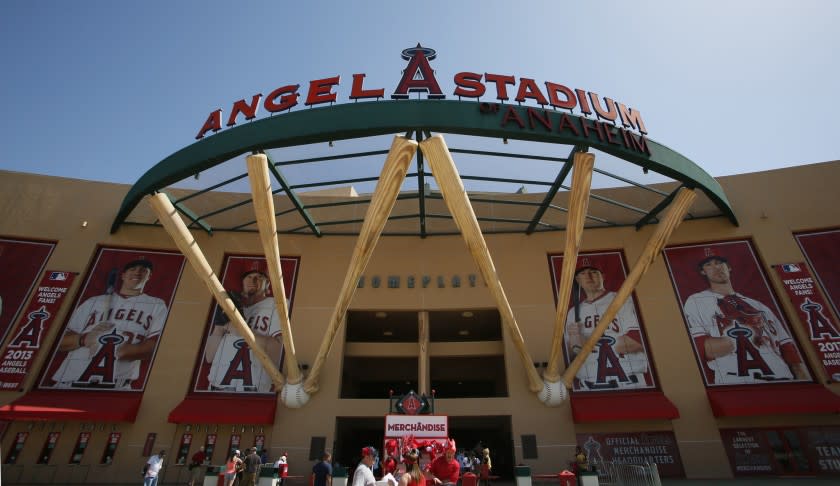Anaheim City Council approves $150-million cash stadium sale to Angels owner

The Anaheim City Council voted early Wednesday to approve a revised deal with Angels owner Arte Moreno, selling Angel Stadium and the surrounding land for $150 million in cash in return for the team’s commitment to stay in Anaheim through 2050.
The council had voted last December to sell the 150-acre site to Moreno’s company, SRB Management, for $325 million. The city this month proposed to credit SRB for $170 million of that price, with the company agreeing to build almost 500 units of affordable housing and a seven-acre park within the community that will rise from the stadium parking lots.
After almost eight hours of debate — and after 1:30 a.m. Wednesday — the council approved the revised deal on a 5-2 vote, with council members Jose Moreno and Denise Barnes opposed. The council must take a second vote next week to finalize the deal, although that is considered a formality.
“This is a spectacular day for Anaheim,” Councilman Stephen Faessel said.
“This was not a deal,” Barnes said. “It was a mess.”
The council rejected Jose Moreno’s motion to eliminate the credits and compel SRB to pay the full purchase price in cash. The council also rejected Barnes’ motion that the vote be delayed until residents could offer comment in person, or at least via Zoom.
Barnes asked why the city did not insist on the right to buy back, at the current sale value, any land SRB might later choose to sell. Kevin Kelley, a Colorado-based lawyer who represents the city, said SRB might not have proceeded with the deal in that case.
“They’re buying the property to make money,” Kelley said.
Councilman Jordan Brandman expressed concern that Moreno could take the money and run. SRB representative Alex Winsberg said the company certainly could add development partners but would not simply flip the property.
“SRB Management and Angels Baseball will be true and lasting partners to the city of Anaheim,” Winsberg said.
In 2005, the Angels changed their team name to the Los Angeles Angels of Anaheim, taking advantage of language in the stadium lease that required the team name to “include the name Anaheim therein.” After wary council members expressed concern that the agreement proposed Tuesday did not sufficiently protect the city from the team moving out of town, Winsberg agreed to tighten language to explicitly limit the Angels’ options to playing in a renovated Angel Stadium or a new stadium that would be built on the adjacent parking lot.
Winsberg also said SRB had agreed to a labor agreement modeled after the one used in the Rams’ stadium project, which provides for union jobs and prioritizes local hiring.
Barnes called the deal “a gift, not a sale,” and she and Jose Moreno took aim at the $170 million in credits. Barnes said the money would be better distributed across the city; Moreno argued the city was subsidizing benefits that would enhance the value of Arte Moreno’s property.
As part of the deal, Councilman Trevor O’Neil noted, the Angels agreed to waive $41 million in disputed reimbursements that the team contended it was owed by the city.
Mayor Harry Sidhu cited a string of benefits: The Angels would stay in town for decades; the team and not the city would pay for a new or renovated ballpark; an estimated 45,000 permanent jobs and as much as $1 billion in tax revenue would result; and a private developer would commit to build on land the city had failed to develop for more than half a century.
“Instead of an empty parking lot, it will be a walkable, vibrant community,” Sidhu said, describing it as a deal that other cities would snatch up if they could.
Yet the deal drew opposition from two former mayors, the city’s representative in Congress and the negotiator hired by the city for a previous round of discussions with the Angels. In a letter to the council, former Mayor Tom Daly criticized what he called “an outrageously one-sided deal … [that] gives away hundreds of millions of dollars of Anaheim taxpayer money.”
A city-commissioned appraisal valued the site at up to $500 million, but only if the stadium were demolished and the site were vacant. Sidhu said the city prioritized retaining the Angels and got fair market value with the stadium on site; Jose Moreno, however, said no one knows whether the city got market value because it did not solicit other bids. The value would have been depressed because, under the Angels’ current lease, the team could have controlled development on the site through as late as 2038.
More than 250 public comments, all delivered via email because the council is not holding in-person meetings during the coronavirus crisis, included a mix of reactions. The deal drew support from some residents, the business community and trade unions. But others said that the sale price was too low, that the deal should have been subject to a public vote and that there had been insufficient public input. A citizens’ group has sued the city, alleging the deal violated state transparency laws.
The comments also included dozens of submissions of the same form letter in support of the deal, almost all copying in SRB and spurred by text-message outreaches by the company. One resident forwarded his response to the city, in which he asked SRB: “Where are you getting the phone numbers to text your development plan?”
“We reached out to a broad list of friends, supporters and contacts and asked that they go to our website, check out our plans, share with friends and show their support,” SRB spokeswoman Marie Garvey said.


